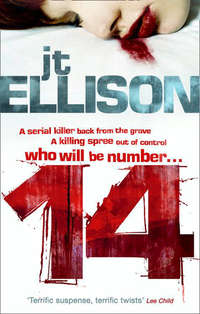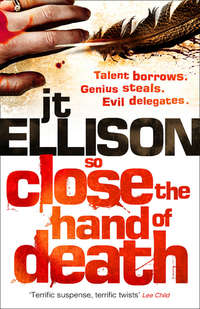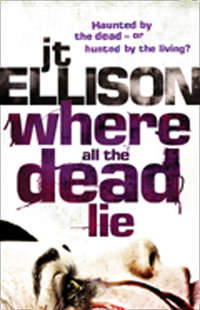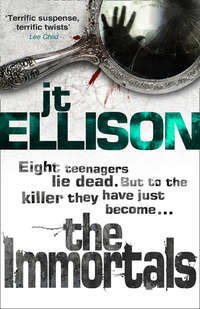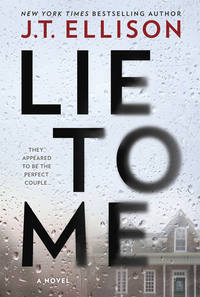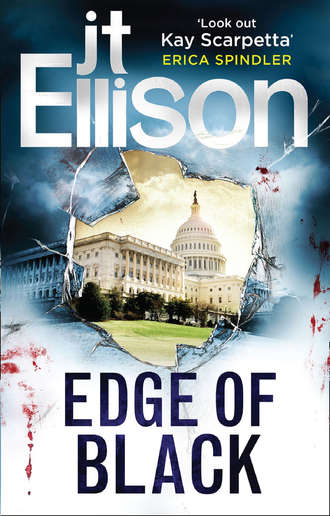
Полная версия
Edge of Black
“Whoops. It’s dead.”
“That’s a seriously cheap-ass phone, lady.”
“It’s a seriously old phone, and I should probably get a new battery for it. Otherwise, it does its job.”
His playful tone changed.
“How bad is it?” He didn’t need to say more.
“I don’t know yet. Fletcher blew me off and Nocek said there were no casualties yet. It’s a biological agent of some kind. What’s the news saying?”
“Multiple contradictory accounts. I’m so glad you’re home. I was worried about you. Are you...okay?”
Sam knew what he was talking about. Since the flood, since she lost her family, these kinds of events had a tendency to shake her. Natural disasters—tornadoes, hurricanes, wildfires, floods—fed her anxiety and caused her to relapse into obsessive hand washing. She tried not to sit up nights watching the Weather Channel, but sometimes succumbed. She felt that the only way she could ever move past the fear was through immersion. If you’re afraid of spiders, you spend time letting tarantulas crawl on your arm. If you’re afraid to fly, you get on airplanes as often as possible.
If you’re worried a terrible flood might sweep your life away...
It wasn’t necessarily a healthy choice, but it worked for her.
Xander, on the other hand, spent his time avoiding all things that could remind him of his own stormy past. He didn’t understand her need to watch, to experience, to relive. To punish herself through others’ pain. He’d served multiple tours in Iraq and Afghanistan, seen things she could only imagine in her worst nightmares. He’d lost friends. He’d spent nights under fire, days in armored carriers driving IED-laden roads, weeks on foot in the desert, not knowing if each breath was his last. When he got out of the Army, he went to ground, alone in the woods, cut off from everyone and everything. Until Sam.
They were a perfect fit. Each damaged, each desperate. Each so very alone.
She considered his question. Was she okay? Strangely, she’d only had a few moments today where she wanted to wash. Instead, she’d been slightly jazzed by it all. She took that as an encouraging sign.
“I’m good. I promise. I was worried about you, too. I’m really glad you’re here, Xander.”
She poured a cup of tea, and they settled in the living room where Xander already had the television on. Every channel was in full-on breaking-news alert. Sam had enough experience with emergency situations to know that half of the information was wrong, and the other half would change fifty times before the end of the day. What they could glean so far wasn’t much more than what Sam already knew.
She flipped channels while Xander used her computer to surf the internet, searching for anything he could find. As a former Ranger, he had a different set of contacts than Sam. When the news broke another piece of the story, Xander would confirm or deny based on what his military brethren were saying across their message boards and chat rooms.
By 5:00 p.m. things had boiled down to a set of certainties no one could deny. Someone had released an airborne toxin in the Washington, D.C., Metro. It caused a progressive pulmonary distress. And two people were confirmed dead.
Everything else at this point was just speculation. The tests were being done on the toxin; so far they’d ruled out some of the obvious—the ones that would have created different symptoms. Sarin, ricin. Anthrax was still high on the list of possibles. The words made chills slip through her system.
The problem was, testing took time.
Just the idea of that made her skin crawl.
Sam decided she’d had enough. She went to the kitchen and began making dinner. She’d just unwrapped a head of butter lettuce when her phone rang. She glanced at the caller ID, saw Fletcher’s number. She pretended not to notice the uptick in her pulse as she answered.
“Fletch? Everything okay?”
“No. I need you, Sam. I’ll be there in five minutes. Meet me out front, we don’t have much time.”
“Need me for what?” she asked, but he’d already hung up the phone.
She replaced the receiver and put the lettuce back in the refrigerator.
Xander was on the laptop in her office. “Hey,” she said. “Anything new?”
“No. Same old shit—speculation and fear mongering. No one has a clue what’s going down.”
“I have to go. Fletcher just called. He’s picking me up in a few minutes.”
He rolled back in the chair. “Go where?”
“I don’t know. He just said he needed me and to meet him outside.”
“Why don’t I come with you?”
“I get the sense I may be a while. He sounded totally stressed-out. They might just need some extra hands.”
“But there’s only two dead.”
“Xander, I have no idea what he needs. I would assume it’s my services with the sharp end of a scalpel. Come out to the street with me, let’s see what’s happening. I’m sure he’ll tell us when he gets here.”
She grabbed her bag and her phone, tossed a light sweater over her shoulders just in case. Xander held her hand as they walked down her front steps to wait for Fletcher. She appreciated that he didn’t nag her about running off with another man. He was special, he knew it, and he was comfortable with his place in her world.
They didn’t have to wait long, Fletcher arrived with a squeal of tires a moment later. He put the passenger window down.
“Get in, Doc. We gotta go.”
She stuck her head in the window. “What’s up?”
He shot a glance at Xander, who was leaning in as well, over her shoulder. His face tightened imperceptibly.
“Classified.”
“Come on, Fletcher. He has the right to know.”
“Sorry. This one comes from above. You can call him later. Now, Sam. I’m not kidding.”
She turned back to Xander, who had a frown on his face. “I’ll call you as soon as I know anything. Don’t worry, okay?” She kissed him lightly, then got in the car before he could protest.
Fletcher slammed the gas and the car leaped from the curb. Sam grabbed the seat belt and jammed it into the lock.
“Jesus, Fletch. What the hell?”
He didn’t move his eyes from the road, spoke grimly.
“Congressman Leighton is dead.”
Chapter 5
Sam recognized the congressman’s name, but that was all. She told Fletcher that. He glanced over at her and barked a small, humorless laugh.
“You’re probably the only one in D.C. who doesn’t know everything about him. Peter Leighton is the head of the Armed Services Subcommittee. Four-term congressman from Indiana, Democrat, big-time dove. He’s been shooting down the military for years, authoring bills to cut spending, shutting down VA hospitals, the works. But lately, he’s had a change of heart. He authored an appropriations bill that will give more funding to the military. It’s a massive reversal. He’s been under fire.”
“Now I’ve got him. Xander isn’t a fan.”
“I can’t imagine why not,” he said drily.
“So what’s the story?”
“He collapsed in his office on the Hill about two hours ago. They said he was having trouble breathing. He was dead on the scene but they transported him anyway. Called it at GW half an hour ago.”
“And I’m racing with you where, why?”
“Morgue. Nocek wants you to help post him.”
“Why me?”
He glanced at her again. “I may have asked if he’d be cool with having you come in.”
“I’m flattered. Again, why me?”
“Because something isn’t right with the congressman’s death. I want to move fast, and I trust you to take an unbiased look. That’s all I’m going to say.”
“Cloak-and-dagger doesn’t suit you, Fletch.”
“Just trust me, okay?”
“Was he on the Metro this morning?”
“Undetermined.”
“God, you sound just like Xander when he doesn’t want to give up information. One word grunts. Come on, Fletch. I can’t do my job if you don’t give me the facts.”
He sighed. “They’re still running air-quality tests in the Metro. Nothing is registering. It’s not ricin, sarin or anthrax. It made over two hundred people really sick, but only two are confirmed dead. They were on the Metro early this morning, so the thinking is they were exposed directly, soon after the toxin was released. More could die—there are a few in medically induced comas and a couple in critical. We need to find out what the cause was, and fast, so the injured can get proper treatment.”
“Shouldn’t I be posting the two who died then?”
“Nocek is on it. He and his team finished the two from earlier and have run all the samples to the labs. But Leighton is different.”
“Different how?”
“Just...trust me.”
They were screaming up Constitution now, heading toward the Capitol. Even in a disaster, the view was stunning. The lights of the city shone brightly on the eerily empty sidewalks. The corners were manned by police in full armor, weapons at the ready. No one was on the streets, an unnerving sight. She’d never been able to travel so quickly through the city before—Fletcher had his mounted light going, was blowing through the stoplights like they didn’t exist. Sam was getting the sense that something much, much bigger was going on than just the death of a congressman.
* * *
The morgue was as depressingly bland and old as it had been the last time she’d been forced to visit—to do a secondary autopsy on her former boyfriend, Edward Donovan. Donovan’s murder had led her directly to Xander, who had been, at the moment she met him, the police’s prime suspect. Things worked out for the best, but she hadn’t held a scalpel over dead flesh for three months.
Would she be rusty? Would she be compelled to wash? Would the stillness overwhelm her and make her run away?
She didn’t like not knowing how she was going to react. It made her anxious. And her anxiety triggered all kinds of demoralizing, embarrassing tics.
She hadn’t been like this before the flood. She had never considered herself a strong woman, that was Taylor’s job. But Sam was steady. Reliable. Rational. She saw herself as a skilled forensic pathologist, nothing less, nothing more. She wasn’t a people person to start with, had few friends she truly trusted, but now she got to add in a dead husband and a lost family. She’d been systematically pushing people away for two years, and at the moment, their invisible absence stung.
Jesus, Sam. Way to go, feeling sorry for yourself in the middle of someone else’s crisis.
She shook her head slightly to dispel the melancholy, and followed Fletcher into the morgue.
A small, young woman with lively green eyes was waiting for them.
“Detective Fletcher? Dr. Owens? I’m Leslie Murphy, death investigator. Dr. Nocek is waiting for you. The press hasn’t arrived yet, but it’s only a matter of time.”
Sam turned to Fletcher in surprise. “You’ve managed to keep this quiet?”
He gave her a smug grimace. “I told you it was classified.”
Sam shook Leslie’s hand. “Let’s get me suited up then.”
“Right away, ma’am. Follow me.”
“Please don’t call me ma’am. Sam is fine.”
The girl looked back over her shoulder. “I’m Murphy then. My mom’s the only one who calls me Leslie.”
“Gotcha,” Sam said.
The doors opened into the antechamber that led to the autopsy suite, and Sam was pleased by her reaction. She felt relaxed, comfortable. The tension bled from her shoulders.
Home. You’re home.
Moments later, gloved and prepped, she entered the nave of her own personal church.
The smells were right. The air, cold and dead, whispering from the vents. The warm musk of blood, the slight meaty scent of open bodies. Metallic notes from the stainless tables and scales, overlaid with the squeaky markers used on the whiteboards. Thin scents of bleach and formalin, worn linoleum, and sweat.
The normal aromas of the autopsy suite, as comforting and natural to her as fresh roses in a vase.
Sam heard Fletcher curse softly under his breath. She caught his gaze and understood immediately.
A small boy lay in full rigor on a table off to the side, against the far wall. Out of the way. Eight, maybe nine years old. A quiet hush went through her, perhaps a prayer, maybe less than that. Her own son hadn’t gotten out of his second year; she had no way to compare the real with the might-have-been—the length of bone in the femur, or the shock of dark hair, only slightly mussed. The marble pale flesh of his body, unmarred for the moment.
Nocek caught them staring. “Such a saddening case. He was hit by a car while on his bicycle. He was not wearing the helmet, and as such suffered a traumatic brain injury. They took him off life support last night. We will do a partial autopsy, there is no doubt as to his cause of death.”
A partial autopsy—an exterior examination, X-rays, a vitreous fluid sample and blood draw. No cutting. Small mercies.
Sam felt a flash of anger—such a perfect boy, his brain damaged but his organs intact and usable, yet his family had not chosen to allow him to help others through donation. She chided herself for the thought. Who are you to judge, Sam?
She turned away from the child, touched Fletcher once on the shoulder in comfort. He had a son, a live one.
“I’m ready. Where is the congressman?”
“He is separated from the rest. Please, follow me.”
Nocek led them to a door to the right of the main room. “Let us take a few extra precautions. I would request that you double your masks and wear them at all times. We have set up special ventilation for the room. We are still unsure as to what the situation may be.”
Sam washed her hands again, thoroughly, even though she could hardly give the dead man her germs. There were levels of prevention based on the situation at hand. Because of the nature of the investigation, she wanted to be as sterile as possible to ward off any hint of cross-contamination and potential problems down the road. She had to wear special protective gear as well, also just in case. Which was fine, but it got in her way.
Once she was finished and they were all gloved and prepped, they entered what Sam knew to be a decomp suite: every decent-size morgue has a separate room for the decomposed bodies that come in to be posted. For the most part, the natural effluvia of fresh bodies wasn’t terribly offensive to the olfactory system, especially once you grew accustomed to the smells. But decomps were a different story. By isolating them, several things occurred: chain of custody remained intact; special precautions could be taken; evidence collected could be kept separate from the rest of the suite. Blowflies could be isolated; they had a pesky tendency to colonize decomposing bodies. Ashes to ashes, dust to dust. But before that could happen, the biological chain of command kicked into high gear. Blowflies and maggots and larvae, oh my. Sam knew several forensic entomologists who lived for decomps.
Sam noticed several desiccated fly husks near the drain, under the table. Hatchlings, with no food to sustain them. Not unusual.
More interesting was the man lying on top of the stainless tray. Mid-fifties, silvery-gray hair, probably five-ten or so, naked, which was where it got interesting: he was as smooth and hairless as the eight-year-old boy on the other side of the door.
Sam circled the body, absorbing details. There were classic marks on his chest where someone had tried to revive him. His flesh seemed doughy and dented easily, which led her right to excessive edema. The cavities of his mouth and nose were red and irritated, his throat slightly ulcerated. Petechial hemorrhaging in his blank, bluish eyes gave her even more bits of the story.
It hadn’t been an easy death, that was for sure.
She looked closer at his legs, groin and chest, ran her fingers along his calf. The stubble there was no more perceptible than Sam’s was at the end of the day, several hours after she shaved her legs during her morning shower.
The congressman shaved his legs. And everything else, besides. This took manscaping to a whole new level.
“He shaved. His whole body. Thoroughly. Regularly. And practiced. Why?”
Neither man responded, and she started to get a glimmer of why she’d been asked to come in and do the post on the congressman. Discretion was needed. Real discretion.
“What was he into?” she asked.
“We don’t know for sure,” Fletcher answered. “There’s been scuttlebutt about him for years, but really subtle stuff. A couple of the girls in town might have mentioned in passing that he enjoyed trying on their clothes. Primarily their underclothes.”
“Seems harmless enough. He wouldn’t be the first cross-dresser in the government.”
“And a couple of the boys might have mentioned he liked to have a few cameras around while they did their thing.”
Sam met Fletcher’s eyes. “A bisexual cross-dresser with film? Anyone ever gotten their hands on it?”
“I haven’t seen it. And a few of them have said he’s gone a bit too far before.”
“Too far how?”
“Choke and revive. People being asked to play dead. That sort of thing.”
“Sounds like you have more than rumors to go on,” Sam said.
“Listen, Doc. This guy is a really big deal. Former dove, now an outspoken proponent for the military, looking for funding from every quarter. Served for years, a decorated veteran. He has a kid in Afghanistan. He had a presidential run in mind. His proclivities get out, it’s embarrassing for a whole bunch of people, you know?”
“He’s just a study in contradictions.”
“Sam...”
“That’s fine, I understand. But why all the secrecy around his autopsy?”
“Because of this. A text that came to the congressman’s phone. His office reported it about an hour ago.”
Fletcher pulled his notebook from his pocket and read the text verbatim.
Dear Congressman Pervert,
You messed with the wrong people.
Today’s attack is on you, shithead.
Chapter 6
Washington, D.C.
Alexander Whitfield
Xander didn’t like waiting, even though it was something he was accustomed to doing. In the three years since he’d left the service, he’d been marching to the beat of his own drummer. His background made that an easy choice—his parents had been hippies who lived on a commune, and originally named him, in the trippy-dippy fashion of all their friends, Alexander Moonbeam. He’d taken the necessary steps to reclaim a normal name and was now legally Alexander Roth Whitfield. The Third.
And instead of Moonbeam, which his parents still preferred, he went by Xander.
Xander’s grandfather was a hearty son of a bitch who ran a television enterprise. Xander’s dad had told his father to take the money and shove it, and as such, married Xander’s mom, Sunshine, and had two children in quick succession, Xander and his sister Yellow. They moved their burgeoning little family from San Francisco to a mountain farm in Dillon, Colorado, when Xander was a baby. He’d grown up in the woods, homeschooled, self-motivated and a prodigy. His parents were furious when he enlisted instead of attending Julliard. Dedicated pacifists, they didn’t know where they’d gone wrong. They wanted a life of pleasure for him, a life without hatred or fear. Instead, he ran headlong in the other direction.
When he was eighteen, he didn’t know how to make them understand his point of view. He didn’t want to smoke dope and drop acid and find the universal meanings of life in the shiny swirls of colorful trips. He didn’t want to grow organically or manufacture hemp linens. He wanted to see the world. He wanted to give back to the land who’d given him the freedom to make that choice. Yellow had been a dutiful daughter, opened a metaphysical shop in Modesto, California, carried her parents’ all-natural products. Xander played with guns.
There was something as soothing about disassembling an assault weapon blindfolded as there was in mastering Chopin for him. He knew he was different. Smart, yes, but there was something more. Something he couldn’t put his finger on. His commanding officers called it courage, intelligence, instinct. The school psychiatrists called it genius. His parents called him gifted.
He just saw it as a way to distinguish right from wrong, to use his gifts to milk the world of its incredible beauty. Under his fingers, the piano could render 8400 chords, each of which, when combined with another, told a story with infinite possibilities. Bullets did the same thing, if used properly.
He ended up in infantry on purpose. He could have been a pilot, he just didn’t feel like dealing with all the extra training. It was more enjoyable to be on the ground than in the air, anyway. More chance for a little one-on-one action, instead of floating above it all. He’d actually started the Apache training once, but pulled out to go to sniper school when a candidate had to drop and a slot unexpectedly opened. He was nineteen at the time with a raging hard-on for the Army. Anything they wanted to teach him, he wanted to learn.
Age tempered his enthusiasm a bit, but only just. Ranger School, Airborne, Sniper, Demolition—anything they could throw at him, he jumped at the chance. It was so different from the world he grew up in, so structured, so formal. There were regulations that he was expected to follow, and he thrived in the environment. Of course, he was a rising star, which meant he was getting respect and extra attention along the way, and that helped things a great deal. If he’d been a grunt and been treated like a grunt, dismissed out of hand by his superiors, he may have felt differently. He recognized that, tried to keep his star from burning too brightly so he could at least maintain some friendships along the way. If he hadn’t been an enlisted man, he could have gone pretty damn far.
But he mustered out at First Sergeant and was happy as hell to go. The Army had changed in the years he’d been suckling at her teat, marveling at his toys. A war that he felt was mismanaged, an officer he respected committing the ultimate sin, the constant day-to-day grind that became his life in the desert, fighting for every little thing he could gather up for his men—it turned him sour on the whole enterprise. After the shooting of his friend Perry Fisher, who they’d jokingly called King, it was all over for him. He knew the military would never again have that shine, the excitement that it first held, so he took his gear and his medals and his still-living ass and hurried on home.
Part of him was ashamed, and the other part knew it was for the best. The Army was an ever-evolving beast, and in the intervening years, as he grew from boy to man to warrior under their direction, it had become a different place, a political football. He didn’t feel his skills were being put to proper use, nor those of any of his brethren.
Of course, they were all dead now, too. He was the only one left from his tight-knit unit, and he felt the absence of his comrades keenly. When he mustered out, he found a quiet place in the mountains, away from everyone, his family, his friends. He led a monastic life on the land—something his parents could finally get behind.
The Savage River forest was kind to him. He fished and hunted when he needed meat. He brought vegetables and herbs from the ground when he needed flavors. He picked fruit from the trees when he needed something sweet. He watched the breeze wind sinuously through the trees when he needed a distraction, and used the sun and the moon as his guide when he needed to establish time. He was happy alone, felt safer that way. Since he’d been trained to kill, to be able to take a life without a second thought, he felt the need to repent.
The joke among his brethren, what do you feel when you kill a terrorist? Recoil.
And not the kind that meant your stomach was turned.
Repent wasn’t the right word. Recalibrate was more like it. He was a dangerous man, and he knew it. His mind needed to adjust back to the world where threats didn’t linger in the shadows, where he could sleep without his hand on the trigger.





